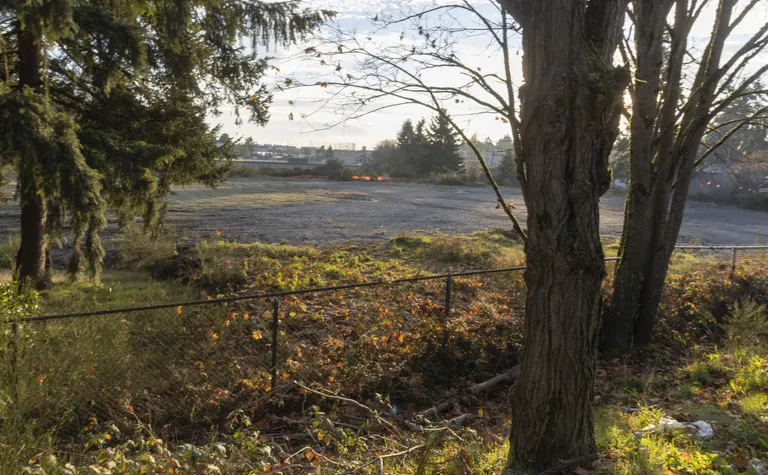Burien has chosen this lot owned by Seattle City Light at South 136th Street and 4th Avenue South as the future site for a tiny home village. The village will use King County money and resources, after months of delay and debate around how to handle a growing number of homeless people in the public eye. (Ellen M. Banner / The Seattle Times)
After months of debate, Burien has chosen a site for a potential new homeless shelter.
It almost didn’t happen.
In June, King County offered Burien $1 million and 35 Pallet shelters, which are similar to tiny homes, to help address a homeless encampment of a few dozen people that had turned into a political crisis for the city.
The city tried clearing the encampment several times, but without any shelters for single men in the city, the tents would appear again in another location. In September, Burien passed a ban on camping anywhere in the city, which courts have ruled unconstitutional for cities to enforce without offering another place for them to go.
After months of Burien not taking King County’s deal, county officials gave the city a deadline of Nov. 27 to select a location for the structures or risk losing them.
During a special meeting on Monday, the City Council voted 4-3 to accept the county’s funding and shelters and locate them in a vacant lot owned by Seattle City Light at South 136th Street and Fourth Avenue South.
However, the county still needs to release the funds and Seattle needs to sign off on the use of the land.
“King County is working with our partners at the King County Regional Homelessness Authority to determine the next steps for the project,” said a King County statement.
Arguments over location caused the biggest delay in accepting the county’s offer. Councilmembers had concerns with each of the three final options. One was being rented by a local car dealer, neighbors argued another was an unsuitable location for a homeless shelter, and the Seattle City Light-owned lot is near a high school.
The other point of contention was defining the rules that determine whether a person can stay in a Pallet shelter. On Monday, councilmembers voted to prohibit registered sex offenders and anyone who is under the influence of alcohol or illegal drugs from staying there.
Most of King County’s shelters are considered “low-barrier,” meaning that there are few restrictions to who can stay. Those shelters tend to have better rates of people going into them, because they don’t require residents to be clean and sober, only to refrain from using drugs and alcohol on site.
City Councilmember Cydney Moore, who has urged other members to loosen restrictions, called it a compromise with other councilmembers.
“We know that implementing barriers to accessing shelter — for example, restrictions on people who use drugs — minimizes the impact shelters have,” Moore said.
The city will also require 90% of Pallet shelter occupants to be people who were homeless in Burien.
The shelter will operate for up to one year, or until the $1 million from King County runs out. According to the city’s most recent estimates, it could cost $900,000 to $1.1 million to operate the Pallet shelter community for one year with 24/7 staffing.
Mayor Sofia Aragon voted against siting the Pallet shelters at the Seattle City Light-owned lot because she said the city lacked sufficient control over that property. But she said the city had learned a lot about homelessness over the past six months.
“We can’t get there alone. It is a regional issue,” Aragon said.
The King County Regional Homelessness Authority wrote in a statement that it was “grateful to the City of Burien for this progress towards connecting the community’s most vulnerable to shelter and supportive services.”
The Regional Homelessness Authority will request bids from nonprofits to select an organization to operate the Pallet shelter community. The authority said that process typically takes three months.
The city of Seattle has not yet authorized the land to be used for a homeless shelter. A spokesperson for the city said a lease agreement including the cost and length of contract would be negotiated after the city of Burien and the Regional Homelessness Authority submitted a proposal to use the site for that purpose.




